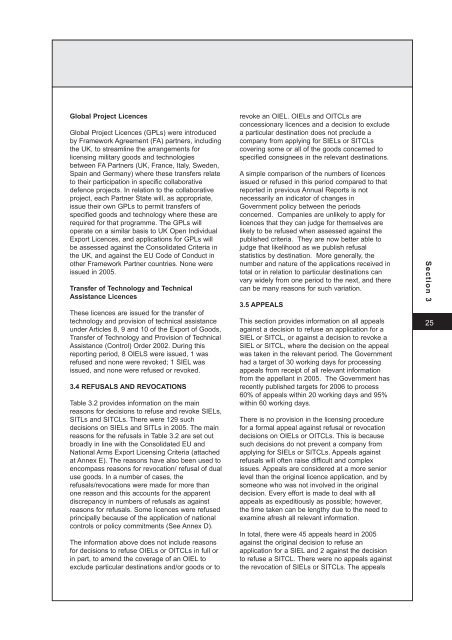Annex A - Official Documents
Annex A - Official Documents
Annex A - Official Documents
Create successful ePaper yourself
Turn your PDF publications into a flip-book with our unique Google optimized e-Paper software.
Global Project Licences<br />
Global Project Licences (GPLs) were introduced<br />
by Framework Agreement (FA) partners, including<br />
the UK, to streamline the arrangements for<br />
licensing military goods and technologies<br />
between FA Partners (UK, France, Italy, Sweden,<br />
Spain and Germany) where these transfers relate<br />
to their participation in specific collaborative<br />
defence projects. In relation to the collaborative<br />
project, each Partner State will, as appropriate,<br />
issue their own GPLs to permit transfers of<br />
specified goods and technology where these are<br />
required for that programme. The GPLs will<br />
operate on a similar basis to UK Open Individual<br />
Export Licences, and applications for GPLs will<br />
be assessed against the Consolidated Criteria in<br />
the UK, and against the EU Code of Conduct in<br />
other Framework Partner countries. None were<br />
issued in 2005.<br />
Transfer of Technology and Technical<br />
Assistance Licences<br />
These licences are issued for the transfer of<br />
technology and provision of technical assistance<br />
under Articles 8, 9 and 10 of the Export of Goods,<br />
Transfer of Technology and Provision of Technical<br />
Assistance (Control) Order 2002. During this<br />
reporting period, 8 OIELS were issued, 1 was<br />
refused and none were revoked; 1 SIEL was<br />
issued, and none were refused or revoked.<br />
3.4 REFUSALS AND REVOCATIONS<br />
Table 3.2 provides information on the main<br />
reasons for decisions to refuse and revoke SIELs,<br />
SITLs and SITCLs. There were 129 such<br />
decisions on SIELs and SITLs in 2005. The main<br />
reasons for the refusals in Table 3.2 are set out<br />
broadly in line with the Consolidated EU and<br />
National Arms Export Licensing Criteria (attached<br />
at <strong>Annex</strong> E). The reasons have also been used to<br />
encompass reasons for revocation/ refusal of dual<br />
use goods. In a number of cases, the<br />
refusals/revocations were made for more than<br />
one reason and this accounts for the apparent<br />
discrepancy in numbers of refusals as against<br />
reasons for refusals. Some licences were refused<br />
principally because of the application of national<br />
controls or policy commitments (See <strong>Annex</strong> D).<br />
The information above does not include reasons<br />
for decisions to refuse OIELs or OITCLs in full or<br />
in part, to amend the coverage of an OIEL to<br />
exclude particular destinations and/or goods or to<br />
revoke an OIEL. OIELs and OITCLs are<br />
concessionary licences and a decision to exclude<br />
a particular destination does not preclude a<br />
company from applying for SIELs or SITCLs<br />
covering some or all of the goods concerned to<br />
specified consignees in the relevant destinations.<br />
A simple comparison of the numbers of licences<br />
issued or refused in this period compared to that<br />
reported in previous Annual Reports is not<br />
necessarily an indicator of changes in<br />
Government policy between the periods<br />
concerned. Companies are unlikely to apply for<br />
licences that they can judge for themselves are<br />
likely to be refused when assessed against the<br />
published criteria. They are now better able to<br />
judge that likelihood as we publish refusal<br />
statistics by destination. More generally, the<br />
number and nature of the applications received in<br />
total or in relation to particular destinations can<br />
vary widely from one period to the next, and there<br />
can be many reasons for such variation.<br />
3.5 APPEALS<br />
This section provides information on all appeals<br />
against a decision to refuse an application for a<br />
SIEL or SITCL, or against a decision to revoke a<br />
SIEL or SITCL, where the decision on the appeal<br />
was taken in the relevant period. The Government<br />
had a target of 30 working days for processing<br />
appeals from receipt of all relevant information<br />
from the appellant in 2005. The Government has<br />
recently published targets for 2006 to process<br />
60% of appeals within 20 working days and 95%<br />
within 60 working days.<br />
There is no provision in the licensing procedure<br />
for a formal appeal against refusal or revocation<br />
decisions on OIELs or OITCLs. This is because<br />
such decisions do not prevent a company from<br />
applying for SIELs or SITCLs. Appeals against<br />
refusals will often raise difficult and complex<br />
issues. Appeals are considered at a more senior<br />
level than the original licence application, and by<br />
someone who was not involved in the original<br />
decision. Every effort is made to deal with all<br />
appeals as expeditiously as possible; however,<br />
the time taken can be lengthy due to the need to<br />
examine afresh all relevant information.<br />
In total, there were 45 appeals heard in 2005<br />
against the original decision to refuse an<br />
application for a SIEL and 2 against the decision<br />
to refuse a SITCL. There were no appeals against<br />
the revocation of SIELs or SITCLs. The appeals<br />
Section 3<br />
25

















